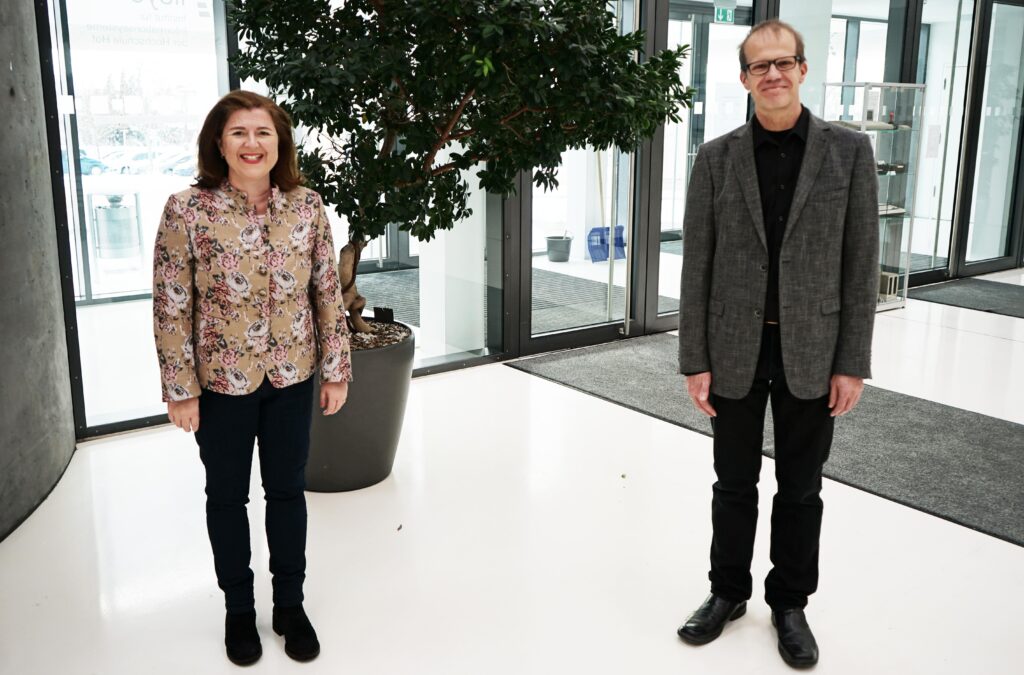Digitization in the healthcare sector is advancing inexorably. Many fears and concerns are associated with it: Will I become a transparent patient? Will I still get insurance if my health data can be accessed electronically in the future? At the same time, many health apps are being used and, since the beginning of the year, even on prescription!
Interdisciplinarity promotes innovation
Two research groups at iisys have established an interdisciplinary research focus on “Digital Health Systems”. The research groups “Analytical Information Systems” and “Law in Sustainability, Compliance and IT” with their leaders Prof. Dr. Jörg Scheidt and Prof. Dr. Beatrix Weber are working intensively together to implement digital innovations in the health sector in a user-friendly and legally compliant manner

Often the third partner in the alliance is smartlytic GmbH, which is based at Einstein1 as a spin-off from iisys. The two managing directors, Dr. Dirk Reinel and Dr. Florian Wogenstein, have earned an excellent reputation not only at Hof University of Applied Sciences with their cooperative doctorates. They were already able to score interdisciplinary points in the IT Law module of their Master’s degree in Internet Web Science. The start-up is a model of success. The students have become outstanding and valued colleagues.
Digitally combating the widespread disease of headaches
The DMKG’s headache and migraine register was developed to support doctors in diagnosing, treating and monitoring the progress of headache patients. By evaluating pseudonymized and anonymized patient data, new scientific findings in the field of headache research (health services research) are to be obtained
Gaps in the care of headache patients can be identified and closed by targeted interventions.
Prof. Dr. Jörg Scheidt
The Headache Registry is operated by the German Migraine and Headache Society e.V. (DMKG). The research group Analytical Information Systems, together with smartlytic, was able to look back on previous projects in the medical field during the conception and implementation: Migraine Radar (Mira) and Cluster Headache Radar (Clura), combined in the citizen science project Headache Radar and moma (module on migraine activity), where a smartphone app for children and parents as well as the web applications for participating pediatricians and adolescents were developed
The proven cooperation with the Ludwig-Maximilians-University Munich is continued for the headache register. Since the access routes of patients as users often run through the app here as well, work is currently underway to expand the app for optional use as a pure headache diary (“app-only”). The Legal Research Group is fighting the users’ fear of misuse of their headache diary: it stands for the data protection-compliant design of the database, which can also create trust with the certification of the headache register as a medical device.
Research database vaccination register
Analytical Information Systems” and “Law and Compliance” are also involved in the Bavaria-wide study “CoVaKo 2021” on the safety and efficacy of the SARS-CoV-2 vaccination. The project, which is being led by the University of Erlangen, unites all six Bavarian university hospitals with different subprojects. It is about three things: the effectiveness of the vaccination in different groups of people, an active recording of side effects and an investigation of breakthrough infections. Breakthrough infections involve recording the risk factors of people who – although vaccinated – become infected with the virus
The task of the two research groups at iisys in CoVaKo 2021 is to establish a research database at Hof University of Applied Sciences and to organize it technically in such a way that data protection and data security are maintained with the greatest possible benefit for research.
Prof. Dr. Beatrix Weber
Once again, smartlytic GmbH is on board. A major challenge is the protection of the patients, because the test subjects – with the exception of the control group – are all infected with COVID-19. The legal conception of the research project therefore focuses not only on data protection, but also on the protection and safeguarding of the rights of the test persons as participants in a medical study in the sense of ethical and responsible science.







